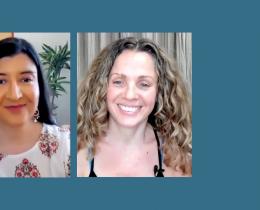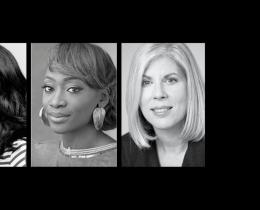Omega: To be a spiritual warrior—an archetype in all traditions—you've said we need to “transcend the stories we make up in our own minds about ourselves and our shortcomings.... It's the labels that we apply and that are applied to us that box us in, break us down, and wear us out." How does this apply to women, specifically, who want to act in service to the greater good?
angel: We all get handed these stories, right? Every one of us—we’re born into a family, a time, a region, a culture. We get handed a story about what we look like. As we express our capacities we get stories about whether we are more or less capable. Not only do we get individual stories, we get collective stories. We miss a great deal when we only pay attention to the story that’s been handed to us and we’re not intimately connected to the deeper story of who we really are—as Buddhists say, before our mother was born. We come encoded with a deep memory of who we’ve always been but when we arrive on the scene our focus is turned toward the external. We forget we have that operating information about who we always are.
In this society and age—even as we have fought and pushed back and challenged it—women have taken on the story of being inferior to men, of the inability to accomplish things without men. Many of us have taken on the story of needing men in order to feel complete in a sexual or romantic way, and the story of the impact that the treatment of men and fathers have on us. This is something that we carry forward with us and there are limitless possibilities of what kind of stories those could be, good and bad.
But we have been uniquely gifted as women with an embodiment of receptive energy—the ability to be receptive where stillness can arise. Feminine energy enables containing and holding and opening up the space to allow more and others in. Because—whether we do it physically or not—life ushers forth, creativity ushers forth, from the feminine. And because of that we are intrinsically oriented against the destruction of life and of creativity.
Of course, there are natural, creative destruction cycles. But because creativity ushers forth from the space of the feminine we know that it isn’t our role to interrupt the creative flow. So it is women that are much more likely to insist on the justice that is necessary for us to have a thriving society that is spacious and equitable for all people. Because the energetic life force ushers forth from us, we understand that it all has a right to be here and a right to thrive until it’s natural, organic cycle comes to an end.
So women have a responsibility to set these stories—that hinder our responsibility and limit our role as the carriers of creativity, as the generators of a greater and greater container that can hold all of life—aside.
Because these stories are fairly random, right? I got born this time to these people in this culture in this society. And I would have been someone different had I taken up the stories of another time, another set of parents, another region, another culture, another side of the country, speaking another language. So how much really of that is you? So why don’t we start choosing the stories that we’re going to take on? Why don’t we choose the stories that most enable and empower us to meet the fullness of our role and responsibilities as the energetic force that supports life and thriving and creativity?
Omega: Is this kind of spirituality an antidote to the “individualistic materialism” you say has become a form of religion in Western culture?
angel: Yes. Like a spiritual warrior, you have to get trained in the skills to interrupt this incredible organism of destruction. So I’m not saying people should just run out and start doing any old thing, but rather develop one’s capabilities. The capacity of the heart and the skill set to be able to say, "I’m not going to be slain by playing the game with a fantasy that that’s how to stop it."
When we withdraw belief in the destruction, it will collapse. We have a deep habit. All the new books in science say if you want to stop a habit the best way is to replace it with a new one. If we can begin to work on strengthening the habit of tuning into, and moving, in love and self-care—healing the places of generational pain and suffering; healing the places of division in our own hearts that keep us separate from the people in our lives, and the people across the road, and across the border—if we develop those habits it will be much easier to divest ourselves of the habit of belief in this system of destruction.
Omega: How do leadership, power, and hierarchy function together in an equitable and holistic community?
angel: I think we’re naïve when we try to flatten something. Hierarchy is a natural response to the diversity of needs that exist in society and the diversity of attention in social orders. In order to focus attention and advance the needs of societies, communities, organizations, homes, families, etcetera, true leadership is a relief. Because it frees each of us to pursue the things we love with a sense of being able to entrust the steering of the ship—not over the edge of the world but pressing forth into the glory of the horizon and the possibilities of new oases of nourishment and places where we can have shelter and be creative and thrive.
So the best-placed leadership reduces burdens rather than being a form of oppression. That’s the relationship I have to leadership and hierarchy in its best expression.
In the best situations, leadership is not a fixed idea—one person leads forever. Rather an emergent leadership in which whoever is most suited toward the task at hand is the leader, people that came before or have particular capacities in that moment, and we all are developed and well socialized enough to follow well, be responsive to that leader, and relate to leadership, not as something that hinders us but something that moves us forward. So we give our full resources to make that leadership successful because the leadership is acting on our behalf. It's not separate from us.
In terms of like social organizations, any organizations that want to engage in a just society that is in any contact with people that are marginalized must have those populations within its decision-making body. Not just to act or advise but in decision making, meaningful capacities to exact power. Or those organizations and institutions are irrelevant. They’re just waiting to find out, because they’re already irrelevant.
It’s a very Eurocentric Western paradigm—we know what people need, so we know how people think. No, we need to know how people move in a space, how they sit at a table. Do they sit in circles or across from each other or in rows? All of that teaches the cultural expression and diversity. Diversity opens new windows of insight into how can we organize space for the whole. Everybody gives up a little bit of room so we can all fit into the circle comfortably.
As it turns out, we all don’t need the same amount of space so it doesn’t have to be equal. It has to be equitable. We don’t drink or eat the same amount. Some of us need to be in the sun more often. Some of us need access to art. We’re really different.
If we’re willing to be complex in our solutions and our willingness to look at things, and not be slave driven by economic imperatives, and slow down and meet each other—we can do this.
We forget. I fully trust that the people that seem like they don’t want to meet us have just forgotten. And we should hold space for them so that when they come to their senses and they remember, it’s safe for them and we’re not against them. We’re for them.



